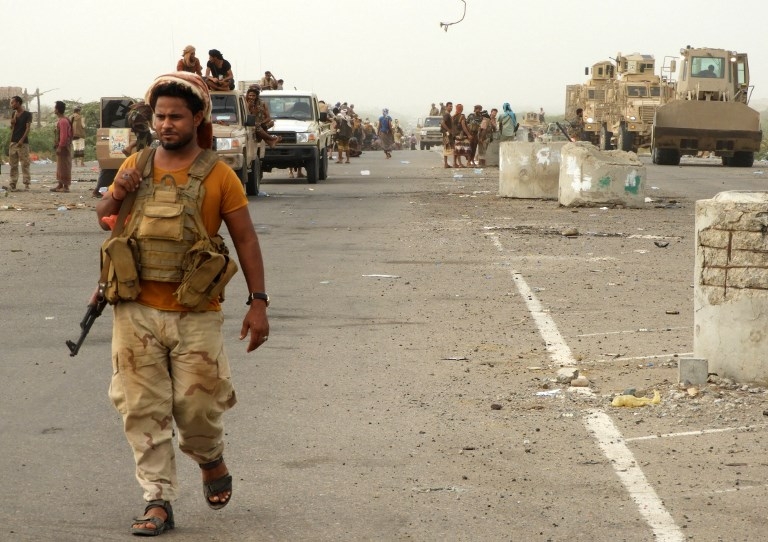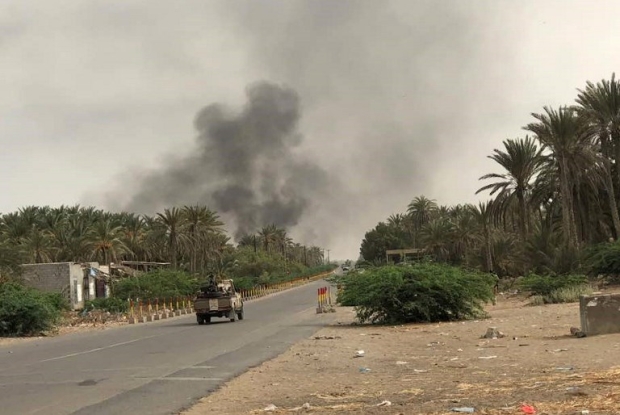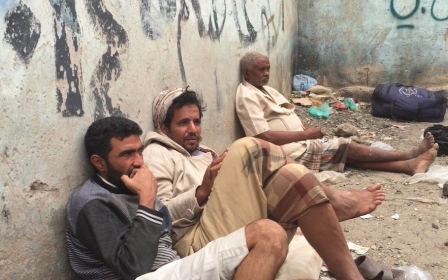Yemen war: The latest chapter in Western efforts to crush independence

Last month, the long-dreaded invasion of the port city of Hodeidah finally began. Although there is now a “pause” in fighting as UN envoy Martin Griffiths attempts to persuade the Houthis to give up the port, this is unlikely to last.
The ceasefire probably came about because the western-backed coalition needed time to lick its wounds amid ferocious resistance, which saw an Emirati ship destroyed and missiles hitting Riyadh for the first time. However, the coalition's western backers will no doubt demand that it fights on after determining a propaganda mechanism for blaming everything on the Houthis.
In a country dependent on imports for 90 percent of its food, fuel and medicine, Hodeidah is Yemen's lifeline, through which 70 percent of the country's supplies arrive. The battle now underway will likely knock out its capacity for months, potentially tipping Yemen into all-out famine. Already, one child starves to death every 10 minutes, in the world’s worst humanitarian crisis.
Strategic objective
Why is this happening? Why is the world - not only the 10-member coalition led by Saudi Arabia and the UAE, but also the US, Britain, France and others - so willing to sacrifice the lives of potentially millions of men, women and children, to help the Saudis prevail over their impoverished southern neighbour?
The truth is that this war has but one overarching strategic objective: to prevent an independent Yemen at all costs.
A century ago, as the First World War neared its indecisive conclusion, the port city of Hodeidah was subjected to another naval blockade. Then, like now, the belligerent powers were Britain and the al-Saud family.
While British troops besieged and ultimately occupied the city, forces loyal to Ibn Saud embarked on an orgy of violence, conducting pogroms that would scar popular attitudes towards Britain and the Sauds for generations. Once again, the motive was to strangle an independent movement that had taken root in Yemen.
Yemen has always posed a particular problem for empire, as, historically, its paramount position at the hub of the Afro-Asian trading system ... gave it an unrivalled strategic importance
Back then, Britain's main rival for control of southern Arabia after the fall of the Ottomans was Imam Yahya, a powerful Zaidi ruler who had taken on his rivals and established his authority across the region that came to be known as North Yemen. He proved himself an adept thorn in the side of the British for years to come.
His insubordination marked the start of a century-long history of Yemeni resistance to western diktat, a story that is the subject of a masterful new study by historian Isa Blumi titled Destroying Yemen: What Chaos in Arabia Tells Us About the World.
Blumi's work provides an invaluable service to those seeking to understand the current war on Yemen in its historical context, explaining the attack currently underway as part of an effort to thwart Yemeni independence that has been ongoing for at least a century.
‘Balancing’ the great powers
Yemen has always posed a particular problem for empire, as, historically, its paramount position at the hub of the Afro-Asian trading system - the precursor to today’s global economy - gave it an unrivalled strategic importance.
By the time Imam Yahya came to power in 1904, he was able to unify the most powerful families and networks under his leadership, in a way that made the young kingdom a formidable entity for the British empire to contend with.
For a start, he refused to recognise British sovereignty over Aden, and worked hard to "balance" other great power suitors - such as Italy and the US - against Britain, without allowing himself to become anyone's vassal. For Blumi, Yahya is an early master of what became the Third World's Cold War strategy par excellence - playing rival great powers against one another.
After the Second World War, Yahya was again able to marshal inter-imperialist rivalries to his advantage, this time between Britain and the US. Again, he was able to do so without compromising his independence; he gained much-sought diplomatic recognition from the US in 1946 - much to the horror of the British - but denied them any actual diplomatic presence in the country until 1959.
Playing rival imperialists against each other
In the meantime, his son Abdullah - representing Yemen at the 1947 world trade conference in Havana - also demonstrated that Yemen was no pushover, grilling his US handler for more than an hour about the "trade charter" they were pressuring him to sign.
Foreshadowing the anti-globalisation movement of a half-century later, Abdullah articulated "an apprehension that signing such agreements seemed to favor big industrial powers like the USA while punishing small countries like Yemen who would have to lower tariffs and undermine their workers' ability to negotiate salaries abroad”, and insisted he would have to take the details back to Yemen for consultation before agreeing to anything, Blumi noted.
Although Yahya was ultimately assassinated in a coup in 1948, the power base he had knitted together refused to recognise his deposers, and soon afterwards, his son Ahmad stormed to power. Ahmad continued his father’s strategy of playing rival imperialists against one another to secure Yemen’s independence from empire.
This independence allowed him to use Yemen's considerable strategic leverage to support not only Palestine and the South Yemeni anti-colonial forces, but also Gamal Abdel Nasser’s revolution in Egypt and the resulting short-lived United Arab Republic (UAR).
At the same time, while making hard bargains with the US, he developed relations with the Communist bloc, signing a trade treaty with the Soviets in 1956. Blumi noted: “With open arms, Imam Ahmad welcomed the Soviet Union and its allies, who all participated in an impressive period of ‘development’ for North Yemen”, providing massive ports, military training and weapons, a sophisticated civilian transport infrastructure, and, in the case of China, major road construction projects that brought tens of thousands of jobs to Yemenis.
"For a critically located, potentially mineral rich country, this 'neutrality' constituted a major defeat for empire," Blumi said. "Perhaps the most humiliating aspect for the engineers of the US branch of this globalist empire, however, was the fact that they had to ingratiate themselves to [Ahmad’s] regime … white men in crew cuts and a history of bossing around Third World leaders did not take kindly to being told in no uncertain terms NO."
Strings attached
Unfortunately, however, Ahmad's Yemen and Nasser's Egypt, which had by 1955 "become joined at the hip", fell out in 1961. The resulting seizure of power by Nasserists in Yemen following Ahmad’s death in 1962 triggered an Egyptian intervention to shore up the new government in what was, at least in part, an attempt to boost its flagging revolutionary credentials.
Initially, the coup was welcomed by both the US and Saudi Arabia, who had long sought to rid themselves of this troublesome imamate. But for Britain, still licking its Nasser-imposed wounds after the Suez crisis, Egypt’s intervention - and especially its establishment of a National Liberation Front in Yemen - was "a sign that London's worst strategic nightmare was unfolding in Aden's neighbourhood".
The Egyptian occupation offered Britain and Saudi Arabia leverage with the imamate, by backing it against Egypt; in Blumi's words, it gave them "a chance to secure influence over a previously inaccessible political theatre", ultimately pushing the new imam into the hands of the British and the Sauds.
Since then, the country has rarely been left alone for long, with anything other than total subordination to global capital met with aggressive hostility from the West. To this end, empire has used the Saudis, sectarian militias, International Monetary Fund austerity and liberalisation, and - as we are witnessing today - outright war. Yet, time after time, they have failed to achieve their goals.
This time will be no different. For, in Blumi's words: "As the coalition of more than ten nations fighting this war on behalf of empire already discovered, Yemenis will bend but not break, and more still, Yemenis will prove to be the deadliest, unflagging enemy empire has ever known.
"And because Yemenis just will not succumb, this war will one day be the point to which empire forever changes and Saudi Arabia itself will disappear. For this, we owe it to Yemenis to honor the sacrifice of tens of thousands, perhaps hundreds of thousands who will die to save us from what is, in the end, our empire."
- Dan Glazebrook is a political writer and editor of stopstarvingyemen.org. He is author of Divide and Ruin: The West's Imperial Strategy in an Age of Crisis and blogs at danglazebrook.com.
The views expressed in this article belong to the author and do not necessarily reflect the editorial policy of Middle East Eye.
Photo: Yemeni pro-government fighters arrive in al-Durayhimi district, just south of Hodeidah's international airport, on 13 June 2018 (AFP)
This article is available in French on Middle East Eye French edition.
New MEE newsletter: Jerusalem Dispatch
Sign up to get the latest insights and analysis on Israel-Palestine, alongside Turkey Unpacked and other MEE newsletters
Middle East Eye delivers independent and unrivalled coverage and analysis of the Middle East, North Africa and beyond. To learn more about republishing this content and the associated fees, please fill out this form. More about MEE can be found here.







